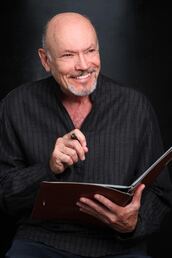The Frisch Approach Workshops
Acting Classes Taught in Santa Monica, Sherman Oaks, Santa Barbara
The Frisch Approach | Transformational Acting
Only the imaginative, risk-taking, transformational actor can inhabit new emotional, physical and vocal territory. To achieve these goals, students are encouraged to approach their work boldly and with a spirited sense of play. They are trained to be in the habit of experimenting and working without fear. Only by taking risks can an actor fully create and inhabit a character.
Peter has directed 160 productions in the New York and regional theatre, produced 150 hours of network television, was Head of Drama at the prestigious Carnegie Mellon School of Drama, and has been on the conservatory faculty at Carnegie, The Juilliard School, Harvard and Boston Universities.
Please visit Peter' website for bio, testimonials and philosophy at https://www.thefrischapproach.com
The Frisch Approach | Transformational Acting
Only the imaginative, risk-taking, transformational actor can inhabit new emotional, physical and vocal territory. To achieve these goals, students are encouraged to approach their work boldly and with a spirited sense of play. They are trained to be in the habit of experimenting and working without fear. Only by taking risks can an actor fully create and inhabit a character.
Peter has directed 160 productions in the New York and regional theatre, produced 150 hours of network television, was Head of Drama at the prestigious Carnegie Mellon School of Drama, and has been on the conservatory faculty at Carnegie, The Juilliard School, Harvard and Boston Universities.
Please visit Peter' website for bio, testimonials and philosophy at https://www.thefrischapproach.com
A Casting Workshop: Audition From Your Strengths
Through an objective process, students discover three or four character types derived from their "look" and personal qualities. Then working on targeted material, actors learn to fulfill each character in order to present themselves as a complete, castable, acting package.
Actor Improvisation Workshop
Emphasis is on the actor rather than performer improvisation. Organic behavior and emotional truth are valued over cleverness. Teaches physical and vocal risk-taking, impulse work and a personal sense of truth. Numerous improv formats are motivated by both internal and external circumstances.
Acting With The Camera
Exercises, monologues and scenes leading to the internalization of emotion needed for on-camera behavior. Students also learn how to adjust for different frame sizes, get accustomed to camera terms, direct, operate camera, and deal with realistic set conditions.
Character Masks
The classic "outside-in" discipline employing a unique collection of celastic masks in the French tradition. Precise character development from the mirror leads to full-blown characters. Behind the "safety" of the mask, actors learn to work boldly and break through habitual limitations.
Dirty Acting
Designed to promote lively, truthful, "dangerous,” moment-to-moment work. Emphasis on risk-taking, impulses, awareness, bold choices and follow-through. Eliminates actor tension, stale performance habits, personal cliches and artificial behavior.
Physical and Vocal Adjustments
Characters probably do not look or talk exactly like you do. Actors experiment and learn how to take physical and vocal risks while integrating these choices into the emotional life of the character.
The Actors Emotional Preparation
Learning what do just before an entrance – how to make strong choices and internalize them right before a character enters. Based on the actor’s choices of intention and obstacle, the right emotional preparation carries the actor through the scene without any need for pushing or falsification.
Sounding Shakespeare
Emphasis on the connection between sound and meaning in Shakespeare. After a sensitizing process, students "sound" the text, putting on Shakespeare's "vocal mask" in order to discover and connect the palpable emotional life. Based on the work of Kristin Linklater. Exercises, monologues, scenes.
Through an objective process, students discover three or four character types derived from their "look" and personal qualities. Then working on targeted material, actors learn to fulfill each character in order to present themselves as a complete, castable, acting package.
Actor Improvisation Workshop
Emphasis is on the actor rather than performer improvisation. Organic behavior and emotional truth are valued over cleverness. Teaches physical and vocal risk-taking, impulse work and a personal sense of truth. Numerous improv formats are motivated by both internal and external circumstances.
Acting With The Camera
Exercises, monologues and scenes leading to the internalization of emotion needed for on-camera behavior. Students also learn how to adjust for different frame sizes, get accustomed to camera terms, direct, operate camera, and deal with realistic set conditions.
Character Masks
The classic "outside-in" discipline employing a unique collection of celastic masks in the French tradition. Precise character development from the mirror leads to full-blown characters. Behind the "safety" of the mask, actors learn to work boldly and break through habitual limitations.
Dirty Acting
Designed to promote lively, truthful, "dangerous,” moment-to-moment work. Emphasis on risk-taking, impulses, awareness, bold choices and follow-through. Eliminates actor tension, stale performance habits, personal cliches and artificial behavior.
Physical and Vocal Adjustments
Characters probably do not look or talk exactly like you do. Actors experiment and learn how to take physical and vocal risks while integrating these choices into the emotional life of the character.
The Actors Emotional Preparation
Learning what do just before an entrance – how to make strong choices and internalize them right before a character enters. Based on the actor’s choices of intention and obstacle, the right emotional preparation carries the actor through the scene without any need for pushing or falsification.
Sounding Shakespeare
Emphasis on the connection between sound and meaning in Shakespeare. After a sensitizing process, students "sound" the text, putting on Shakespeare's "vocal mask" in order to discover and connect the palpable emotional life. Based on the work of Kristin Linklater. Exercises, monologues, scenes.


